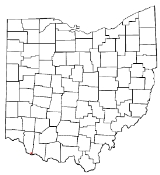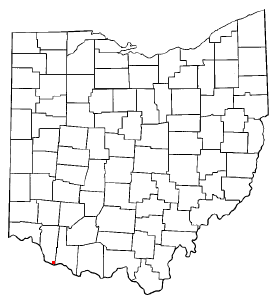
Utopia, Ohio
Encyclopedia

Unincorporated area
In law, an unincorporated area is a region of land that is not a part of any municipality.To "incorporate" in this context means to form a municipal corporation, a city, town, or village with its own government. An unincorporated community is usually not subject to or taxed by a municipal government...
in far southern Franklin Township
Franklin Township, Clermont County, Ohio
Franklin Township is one of the fourteen townships of Clermont County, Ohio, United States. The 2000 census found 4,348 people in the township, 3,329 of whom lived in the unincorporated portions of the township.-Geography:...
, Clermont County
Clermont County, Ohio
Clermont County is a county located in the state of Ohio, United States, just east of Cincinnati. As of 2010, the population was 197,363. Its county seat is Batavia...
, Ohio
Ohio
Ohio is a Midwestern state in the United States. The 34th largest state by area in the U.S.,it is the 7th‑most populous with over 11.5 million residents, containing several major American cities and seven metropolitan areas with populations of 500,000 or more.The state's capital is Columbus...
, United States
United States
The United States of America is a federal constitutional republic comprising fifty states and a federal district...
, along the banks of the Ohio River
Ohio River
The Ohio River is the largest tributary, by volume, of the Mississippi River. At the confluence, the Ohio is even bigger than the Mississippi and, thus, is hydrologically the main stream of the whole river system, including the Allegheny River further upstream...
. Utopia has been referred to as a "ghost town
Ghost town
A ghost town is an abandoned town or city. A town often becomes a ghost town because the economic activity that supported it has failed, or due to natural or human-caused disasters such as floods, government actions, uncontrolled lawlessness, war, or nuclear disasters...
" although there are still people who live there.
Geography
Utopia is located on the northern bank of the Ohio River in the southeast corner of Clermont County, in southwest Ohio. It lies along U.S. Route 52U.S. Route 52
U.S. Route 52 is a United States highway that runs across the northern, eastern and southeastern regions of the United States. Contrary to most other even-numbered U.S...
.
First settlement
Utopia was founded in 1844 by the followers of Charles FourierCharles Fourier
François Marie Charles Fourier was a French philosopher. An influential thinker, some of Fourier's social and moral views, held to be radical in his lifetime, have become main currents in modern society...
, after the failure of an earlier Fourierist phalanstère
Phalanstère
A phalanstère was a type of building designed for an utopian community and developed in the early 19th century by Charles Fourier. Based on the idea of a phalanx, this self-contained community ideally consisted of 1500-1600 people working together for mutual benefit...
called the Clermont Phalanx. Fourier's writings inspired his readers to create their own utopian society — hence the name "Utopia
Utopia
Utopia is an ideal community or society possessing a perfect socio-politico-legal system. The word was imported from Greek by Sir Thomas More for his 1516 book Utopia, describing a fictional island in the Atlantic Ocean. The term has been used to describe both intentional communities that attempt...
."
Within three years, the community broke up. It was soon reorganized by Josiah Warren
Josiah Warren
Josiah Warren was an individualist anarchist, inventor, musician, and author in the United States. He is widely regarded as the first American anarchist, and the four-page weekly paper he edited during 1833, The Peaceful Revolutionist, was the first anarchist periodical published, an enterprise...
, who founded the town as a means of a small cooperative community that could still carry out functions like the outside world. For instance, the town existed with a market economy
Market economy
A market economy is an economy in which the prices of goods and services are determined in a free price system. This is often contrasted with a state-directed or planned economy. Market economies can range from hypothetically pure laissez-faire variants to an assortment of real-world mixed...
and the belief in owning private property
Private property
Private property is the right of persons and firms to obtain, own, control, employ, dispose of, and bequeath land, capital, and other forms of property. Private property is distinguishable from public property, which refers to assets owned by a state, community or government rather than by...
.
First settlers
The sect believed that the world would enter a 35,000 year long period of peace, and that in order to achieve enlightenmentEnlightenment (spiritual)
Enlightenment in a secular context often means the "full comprehension of a situation", but in spiritual terms the word alludes to a spiritual revelation or deep insight into the meaning and purpose of all things, communication with or understanding of the mind of God, profound spiritual...
, they must live in communes
Commune (intentional community)
A commune is an intentional community of people living together, sharing common interests, property, possessions, resources, and, in some communes, work and income. In addition to the communal economy, consensus decision-making, non-hierarchical structures and ecological living have become...
with one another. Fourier's followers had attracted several families to live in Utopia for the fee of $25 a year, and in turn each family would receive a wooden house on a small parcel of land.
Second settlers
The land that was owned by the sect was then sold to John O. Wattles, the leader of another group of Spiritualists. Despite the warnings of the locals, Wattles and the Spiritualists moved the dining hall/town hall brick by brick to the river's edge. The move was completed in December 1847 mere days before one of the biggest floods of the 19th century.Flood of 1847
On the night of December 13, the Ohio RiverOhio River
The Ohio River is the largest tributary, by volume, of the Mississippi River. At the confluence, the Ohio is even bigger than the Mississippi and, thus, is hydrologically the main stream of the whole river system, including the Allegheny River further upstream...
had flooded its banks dramatically and was getting dangerously close to the town hall. However, people were still seeking shelter in the hall because their houses were becoming flooded. During a party that was being held at the hall that evening, the river, many feet above flood stage, washed out the south wall of the building, sweeping out a large number of Spiritualists. Some who were swept away did survive, but most drowned or were overcome by hypothermia in the icy river. The spot at the river bank where the Spiritualists drowned is now rumored to be haunted by their ghosts.
Second settlement
The settlement was reorganized in 1847 as an individualist anarchistIndividualist anarchism
Individualist anarchism refers to several traditions of thought within the anarchist movement that emphasize the individual and his or her will over external determinants such as groups, society, traditions, and ideological systems. Individualist anarchism is not a single philosophy but refers to a...
colony by Josiah Warren
Josiah Warren
Josiah Warren was an individualist anarchist, inventor, musician, and author in the United States. He is widely regarded as the first American anarchist, and the four-page weekly paper he edited during 1833, The Peaceful Revolutionist, was the first anarchist periodical published, an enterprise...
and associates. Personal invitation from the first settlers was required for admission to the community, with Warren reasoning that the most valuable individual liberty
Liberty
Liberty is a moral and political principle, or Right, that identifies the condition in which human beings are able to govern themselves, to behave according to their own free will, and take responsibility for their actions...
was “the liberty to choose our associates at all times.” Land was not owned communally, but individually, with lots being bought and sold at cost, as required by contractual arrangement. The economy of the community was a system based upon private property
Private property
Private property is the right of persons and firms to obtain, own, control, employ, dispose of, and bequeath land, capital, and other forms of property. Private property is distinguishable from public property, which refers to assets owned by a state, community or government rather than by...
and a market economy
Market economy
A market economy is an economy in which the prices of goods and services are determined in a free price system. This is often contrasted with a state-directed or planned economy. Market economies can range from hypothetically pure laissez-faire variants to an assortment of real-world mixed...
where labor was the basis of exchange value (see mutualism
Mutualism (economic theory)
Mutualism is an anarchist school of thought that originates in the writings of Pierre-Joseph Proudhon, who envisioned a society where each person might possess a means of production, either individually or collectively, with trade representing equivalent amounts of labor in the free market...
). Goods and services were traded by the medium of labor notes
Labor notes (currency)
Labor notes are an alternative currency based on exchange of hours of labor.Two early attempts at implementing labor notes were made by social reformers Josiah Warren and Robert Owen following their experiences attempting to establish a utopian community at New Harmony, Indiana, in which currency...
. By the mid-1850s, the community eventually came to contain approximately forty buildings — about half of which were of an industrial nature. Also present were two time stores
Cincinnati Time Store
The Cincinnati Time Store was a successful retail store that was created by American individualist anarchist Josiah Warren to test his theories that were based on his strict interpretation of the labor theory of value. The experimental store operated from May 18, 1827 until May 1830...
.
The impact of the Civil War, the rising prices of surrounding land that made expansion difficult, and the requirement of being invited by the original settlers are said to have led to the eventual dissolution of the project. However, as late as 1875, several of the original occupants remained, and some business in the area was still being conducted by labor notes. By that time, the area had come to be known as Smith’s Landing.
Warren left Utopia a year after its inception to lecture and assist in setting up other colonies. The most significant of these was Modern Times. However, he did return to visit occasionally. After his last visit in the winter of 1855-1856, he remarked:
My visit to that little germ of Equitable society, now eight and a half years old, has given me higher hopes and expectations than I had before dared to entertain. It is not the display that the little group of buildings makes to the eye… but knowing the means by which these… have been acquired, and seeing that there the subject of Equity has had eight years and six months deep study and practical trail, and that from the beginning… the subject had lost nothing with those who first took hold of it… but had gained… from year to year in their highest judgement and affectionate regard.

